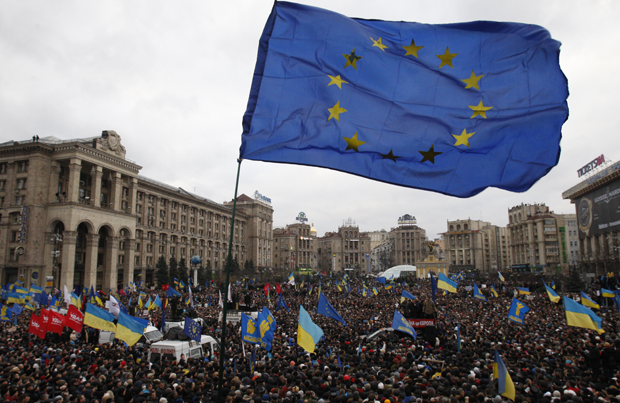
(Photo: Anatolii Stepanov / Demotix)
The coverage of Ukrainian protests in the Russian media suggests a centralised anti-EU message and has provoked outrage in Kiev.
At first, Russian TV channels appeared to broadcast inaccuracies only on the numbers taking part in the demonstrations. Despite clear evidence on the ground that tens of thousands or even hundreds of thousands were taking part, Russian reporters described scenes as “a few hundred protesters.”
Russia’s state-run First Channel then chose to dramatise Ukraine’s alleged descent into anarchy with a montage depicting combat scenes from Yugoslavia in the early 1990s, accompanied by a morbid musical soundtrack.
Komsomolskaya Pravda, a popular Russian daily, led on Tuesday with “Ukraine may split into several parts” with an illustrative map to depict the predicted chaos. The next day, a headline read “Western Ukraine is preparing for civil war.”
Overall – the message from the state-controlled Russian media seems to have been – “Ukraine is suffering at the fate of dangerous opposition militants.”
Putin has lent his weight to the propaganda, describing unrest in Kiev as “more of a pogrom than a revolution” and calling protesters “well-prepared and trained militant groups.”
“Ukraine is like a liner going in a circle,” commented a high-profile Russian journalist this week. “The passengers are calmed by the fact that Europe is near, there is not far to go. In reality the economic collapse of the whole country lies ahead…Passengers will be hurt. Some will not survive.”
The journalist quoted is Dmitry Kiselyov, who Vladimir Putin recently named as head of a re-launched Russia Today — as part of the take-over of previous state broadcaster RIA Novosti.
The shutdown of RIA Novosti was seen as a further degradation in the impartiality of the Russian media — despite being state-owned it had offered some balanced reporting on Russian domestic and foreign policy.
Media analysts in Russia have commented that Kiseylov’s appointment to Russia Today, now the sole government news agency, may have derived from his loyal allegiance to Putin and his ability to propagandise in his favour.
In support of recent anti-homosexual legislation passed by the Russian government, Kiselyov had commented.
“Fining gays is not sufficient -– they should not be allowed to give blood, or sperm and in case of a car accident, their hearts should be burnt or buried as useless”
Kiselyov’s assessment on Maidan went further than his dubious ship analogy — suggesting on his weekly TV show that Sweden, Lithuania and Poland may be manipulating events behind the scenes as revenge for a battle the Russians won in the early 18th century, a battle that happened to be fought in present-day Ukraine.
“It looked like thirst for revenge for Poltava,” argued Kiseylov, citing the name of a battle that took place in 1709.
He then labelled Ukrainian opposition leader and boxer Vitali Klitschko, and his brother Vladimir, as “gay icons,” before describing the “ancient African military techniques,” which the protesters were apparently employing.
He also accused protesters of aggressively firing tear gas at police (when multiple Ukrainian and European media sources confirmed the opposite was correct), and said that opposition leaders had brought students to the protest as sacrificial lambs for the security forces. In fact, police had gone out and savagely beaten groups of students hours before.
Finally, he describes the “writers” of the revolution as a Ukrainian-American-European conspiracy, against Russia.
Skewed Russian coverage has not gone unnoticed in Ukraine. A journalist interrupted a live broadcast from Rossiya 24 – handing over a fake “Oscar” statue in recognition of the “lies and nonsense” that was being reported.
Before being pushed off frame, the Ukrainain Vitaly Sedyuk was able to blurt out “We love Russians but after the way you covered events….”
The Russian reporter ended his piece still holding the fake Oscar statue in his hand.
In contrast to relatively objective reporting in Ukraine, the reporting of Kiseylov and other Russians, combined with a media landscape which has now lost most of its independent voices, indicates the strongest move yet towards total state control of the Russian media.
This article was published on 20 Dec, 2013 at indexoncensorship.org




